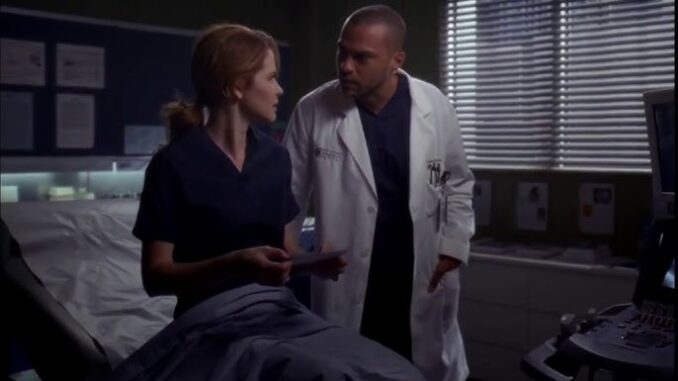
Jackson’s Most Painful Moment: Holding April From the Hands of Death!
Dr. Jackson Avery, the silver-spoon plastic surgeon of Grey Sloan Memorial Hospital, projected an image of composure and control. His life, meticulously crafted with privilege and intellect, rarely hinted at vulnerability. Yet, beneath the surface resided a well of profound empathy and a capacity for intense pain, a pain most vividly revealed in the harrowing moments he fought to save April Kepner’s life after her devastating accident. This wasn’t merely a medical crisis; it was a crisis of the heart, a desperate battle against the seemingly inevitable loss of the woman he loved, the mother of his child, and a soul intrinsically woven into the fabric of his being.
The narrative of April’s accident is etched in the minds of Grey’s Anatomy viewers. A routine trauma call spiraled into a nightmare when the ambulance carrying April careened off the road, plunging into a ravine. Jackson, upon hearing the news, was a man transformed. Gone was the cool, collected surgeon. In his place was a primal force driven by fear and a desperate refusal to accept the possibility of April’s death.
The ensuing hours were a blur of frantic activity. Jackson’s surgical skills, normally applied with precision and confidence, were now fueled by raw emotion. He barked orders, demanding equipment and assistance, his voice laced with urgency that brooked no argument. Each cut, each stitch, each frantic attempt to resuscitate her was an act of defiance against the encroaching darkness. The scene in the operating room was chaotic, a symphony of beeping machines and strained voices, all orchestrated by Jackson’s desperate symphony.
But beyond the medical procedures, beyond the technical expertise, there was the agonizing emotional toll. Every time April’s heart monitor flatlined, every sign of deteriorating vital signs, was a fresh stab wound to Jackson’s soul. He wrestled not only with the immediate threat to her life but also with the memories they shared, the love they had forged and lost, and the future that seemed to be slipping away. He had to confront his role in their separation and reconcile the love he felt for her with their irreconcilable differences. This internal turmoil was visible on his face, etched in the lines of exhaustion and desperation that deepened with each passing moment.
The experience forced him to grapple with:
- The fragility of life: Seeing April so close to death underscored the preciousness and precariousness of human existence.
- The power of love: Even amidst their estrangement, the depth of his love for April was undeniable and drove him to push beyond his limits.
- The limits of control: Despite his skills and resources, Jackson was ultimately powerless against the whims of fate, a humbling realization for a man accustomed to being in control.
In the end, April survived. She pulled through. The relief that washed over Jackson was palpable, a physical weight lifted from his shoulders. But the experience left an indelible mark. He had stared into the abyss and emerged with a renewed appreciation for life, love, and the profound vulnerability that connects us all. While their relationship would continue to evolve, the bond forged in the crucible of that operating room would forever remain, a testament to the enduring power of love and the profound pain of facing the potential loss of someone you cherish. The image of Jackson holding April’s fate in his hands, battling death itself, is a powerful reminder of the depths of human emotion and the enduring impact of traumatic experiences. It solidified Jackson Avery’s position not just as a talented surgeon, but as a deeply compassionate and profoundly human character.